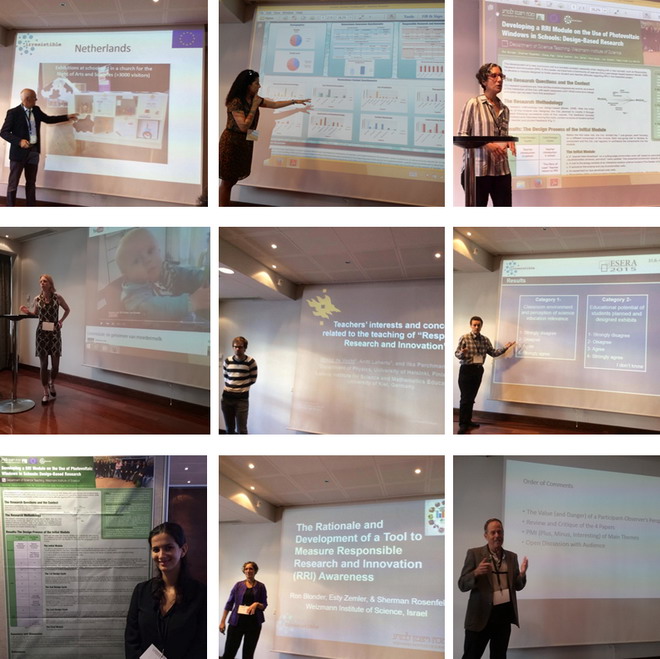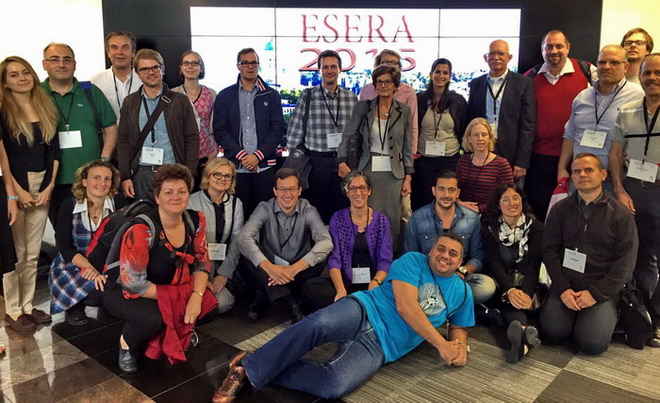Project Irresistible was presented at 11th Conference of the European Science Education Research Association (ESERA), in Helsinki, Finland, between August 29th - September 4th, 2015. Two symposia, poster and paper, were conducted on two different days. Each symposium started with a brief introduction of the Project Irresistible.
On September 1st, 2015, in the poster symposium, with the theme of “Responsible Research and Innovation at school: Involving Teachers and Science Exhibits” led by Anna-Leena Kähkönen, from University of Jyväskylä, Finland, first, 7 partners presented their preliminary results of the project Then a discussion led by the discussant Zacharias Zacharia, University of Cyprus, Cyprus, took place. The first presenter was from The Netherlands, and she presented their poster with the title of “Bringing RRI into the classroom by learning about carbohydrates in breast milk” focusing on the module development process and integration of RRI into inquiry-based classroom environment as well as students’ products. Secondly, partners from Greece made a presentation upon "RRI and nanotechnology: Developing a teaching module and exhibits for primary and secondary students" focusing on teachers’ abilities and difficulties in reconstructing RRI integrated new scientific area of nanoscience and nanotechnology as well as students’ abilities and difficulties to construct exhibits on RRI aspects based on nanoscience and nanotechnology topics. Then, the partners from University of Jyväskylä, Finland, made a presentation with the title of “How do primary student teachers incorporate RRI into their inquiry-based science lesson plans?” focusing on teachers’ approaches in making RRI a part of their lessons, and partners from University of Bologna, Italy presented their poster with the title of “How can RRI become a permanent aspect of science teaching?” focusing on how RRI was integrated in their module and how students’ understanding of the RRI components developed. Next, the partners from Romania made a presentation on “Formal science education activities on nanomaterials designed to promote RRI concepts” focusing on what kind of science activities developed to encourage the development of RRI understanding. Tthe partners from Turkey presented their poster with the title “Integrating RRI to nanoscience applications as extracurricular activity in secondary science education” focusing on the development of nanoscience module and comparison of students’ nanoscience awareness, understanding of RRI and conceptual understanding of nanoscience before and after implementation of this module. Finally, partners from Israel made a presentation with the title “Developing a RRI module on the use of photovoltaic windows in schools: Design-based research” focusing on how their module progressively evolved and curriculum design principles arising during module development process. At the end of the presentations and the discussion lead by the discussant Dr. Zacharia, each poster presenter stood by their poster to continue discussions with the audience.

On September 4th, 2015, during the paper symposium, entitled "Responsible Research and Innovation: The role of science education", led by our coordinator Jan Apotheker, University of Groningen, The Netherlands, 4 partners presented their work. Then a discussion was led by Sherman Rosenfeld, Weizmann Institute of Science, Israel. First, partners from The Netherlands presented a paper with the title “Responsible Research and Innovation: The project ‘Irresistible’” introducing the components of the project, use of 6E model and RRI. Next, the partners from University of Helsinki, Finland made a presentation with the title “Diagnosing teachers’ concerns and interests about teaching Responsible Research and Innovation” focusing on how the innovation of RRI being adapted by the teachers. Partners from Portugal made a presentation on “The potential of student-designed exhibits about Responsible Research and Innovation (RRI): The teachers’ perspective” focusing on teachers’ perspectives on students’ potential to develop exhibits including RRI, and finally partners from Israel presented a paper with the title of “The Rationale of Responsible Research and Innovation (RRI)” focusing on the development of RRI understanding of teachers and students in the Project Irresistible. The symposium was closed by a discussion of the role of science education in Responsible Research and Innovation in the context of Project Irresistible.









